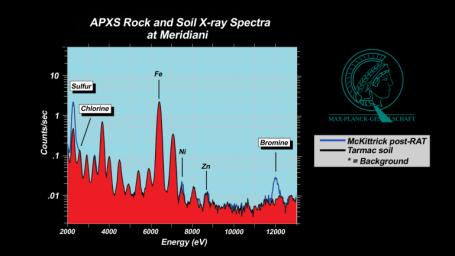
|
History Leaves Salts Behind
- Click the image above for a larger view
- Full-Res JPEG (1920 x 1080) (143.3 kB)
- Full-Res TIFF (1920 x 1080) (600.3 kB)
Caption:
These plots, or spectra, show that a rock dubbed "McKittrick" near the Mars Exploration Rover Opportunity's landing site at Meridiani Planum, Mars, has higher concentrations of sulfur and bromine than a nearby patch of soil nicknamed "Tarmac." These data were taken by Opportunity's alpha particle X-ray spectrometer, which uses curium-244 to assess the elemental composition of rocks and soil. Only portions of the targets' full spectra are shown to highlight the significant differences in elemental concentrations between "McKittrick" and "Tarmac." Intensities are plotted on a logarithmic scale.
A nearby rock named Guadalupe similarly has extremely high concentrations of sulfur, but very little bromine. This "element fractionation" typically occurs when a watery brine slowly evaporates and various salt compounds are precipitated in sequence.
Cataloging Keywords:
| Name | Value | Additional Values |
|---|---|---|
| Target | Mars | |
| System | ||
| Target Type | Planet | |
| Mission | Mars Exploration Rover (MER) | Mars Science Laboratory (MSL) |
| Instrument Host | Opportunity (MER-B) | Curiosity Rover |
| Host Type | Rover | |
| Instrument | Alpha Particle X-Ray Spectrometer (APXS) | |
| Detector | ||
| Extra Keywords | Color, Water | |
| Acquisition Date | ||
| Release Date | 2004-03-02 | |
| Date in Caption | ||
| Image Credit | NASA/JPL/Cornell/Max Planck Institute | |
| Source | photojournal.jpl.nasa.gov/catalog/PIA05467 | |
| Identifier | PIA05467 | |
